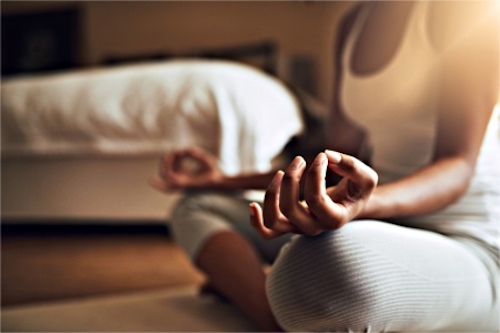When it comes to changes in your sex drive, some of life’s biggest physiological and emotional events — postpartum, perimenopause, and menopause — can make your reproductive hormones become imbalanced. This is when lots of women first experience low libido, fatigue, insomnia, hot flashes, mood swings, or weight gain — all common symptoms of fluctuating hormones. These symptoms can make you feel like a stranger in your own body — which affects your sexual self too, because when you don’t feel well in general, your interest in sex can dwindle as well. That’s why, for many women, feeling better physically is the first step toward boosting libido and sexual satisfaction.

Women also often note other aspects of their lives changing during the transition into menopause. You may be enjoying the new-found freedom from fear of pregnancy or the distraction of menstruation, or be finding new, creative ways of making love to your partner. And you may be finding the confidence to express yourself more freely and openly, and thinking about ways to focus on yourself for a change, including a plunge into new activities. But you may also be experiencing new stressors that often show up in mid-life, such as the ‘empty nest syndrome’ (adult children leaving home), taking care of aging parents, suffering the loss of a partner through divorce or death, or struggling with issues with body image as you age.
Sexual desire: subject to change
Before diving into a discussion of problems, let’s put sexuality in menopause into perspective… “Hypoactive sexual arousal disorder” has been diagnosed in as many as 30-40% of adult women who get evaluated for low libido. This is very likely an overestimation, however, since the diagnosis is based on the male model of sexual arousal, which is much more linear than it is in women. In comparison, female sexuality is more complex. For example, women generally don’t have the same baseline arousal that men do, and their arousal during lovemaking tends to be more greatly impacted by thoughts and emotions — whether that means being fueled or snuffed out. Being diagnosed with a “sexual function disorder” can cause a woman to feel like something is wrong with her, when there may be nothing wrong at all!
Women’s sexuality evolves throughout their lives. The notion of holding onto youth is outdated and limits a woman’s sexual potential, especially as she gets older. Instead, try regarding your sexuality as evolving along a continuum — much like a flowing ribbon; you may find yourself not only feeling at greater peace with it, but also discovering new ways of expressing it in your later years. Studies suggest that most postmenopausal women in intimate relationships still consider sex important and are sexually active, even late in life.
At the same time, sexual problems can show up in menopause that we’re not used to, such as a substantial change in our level of sexual desire, difficulty with arousal, or pain with intercourse. Teasing out the various possible contributing factors — whether physical, psychosocial, or related to relationship — is an important first step toward correcting the problems and ensuring a satisfying sex life in menopause.
Physical causes of low sex drive
A woman’s sexual satisfaction in menopause is affected by a wide range of interdependent physical and emotional factors. Although psychological (e.g., self-esteem) and psychosocial (e.g., personal or cultural attitudes toward sex) factors generally impact the quality of a woman’s sex life to a greater extent than physical factors, any woman with physical symptoms knows how troubling they can be. Fortunately, they’re also surprisingly straightforward to address and improve.
When we look at the physical causes of low sex drive, it’s apparent that most fall under the umbrella of hormonal imbalance. Low libido is commonly accompanied by other symptoms of hormonal imbalance, e.g., sleep problems, hot flashes, night sweats, vaginal dryness, fatigue, or depressed mood. These symptoms can make daily life miserable and can also affect how you perceive yourself. Some women say their symptoms make them feel “old and used up,” as if they’re losing their womanhood — in other words, not very sexy. Getting your hormones back into balance can often bring about relief from menopausal symptoms, as well as restore the sexual desire you’re accustomed to.
How low estrogen can affect your interest in sex
At some point in their lives, approximately 50% of women experience thinning, tightening, dryness, and atrophy in the tissues of the vulva and vagina. These changes can cause irritation, soreness, itching, and pain during intercourse, as well as embarrassing urinary frequency and urgency.
Estrogen keeps the tissues of the “genitourinary” tract strong, resistant to infection, and able to lubricate. As estrogen levels drop in menopause, these tissues receive less blood flow and can become thin and extra-sensitive to irritation. These changes can interfere with almost every aspect of a woman’s life: exercising, sleeping, socializing, and body image, as well as intimate relations with your partner. One large study found that vaginal dryness in peri- and postmenopausal women was associated not just with painful sex, but also with reduced arousal, physical pleasure, and emotional satisfaction. Some women become so discouraged by urogenital aging that they simply give up on sex.
We advise women to speak to their healthcare practitioners at the very first sign of vaginal discomfort. For most women, the situation is not permanent, but taking action can help keep your tissues in good shape and make sexual activity more comfortable.
If symptoms of vaginal dryness or vaginal thinning are relatively new or mild, we suggest using vitamin E vaginal suppositories twice weekly. Another option is to add soy to your diet or use a soy isoflavone supplement. The phytoestrogens in soy promote ‘plumping’ of the tissues and vaginal lubrication in many women. Over-the-counter vaginal lubricants can greatly reduce friction during intercourse. And to keep the mucous membranes moist, it’s essential to drink plenty of water every day.
For lasting improvement, it’s important to address the root causes of vaginal dryness and associated changes. Even with the drop in ovarian estrogen production, the body is designed to make estrogen from secondary sites, such as subcutaneous fat and the adrenal glands, as long as it has the required raw materials and support. Dietary adjustments, nutritional supplements, and targeted endocrine support are key parts of a combination approach to help relieve vaginal dryness and other symptoms that can impair a woman’s libido.
If your vaginal symptoms persist, you probably have less estrogen on board than others. Systemic hormone replacement therapy (HRT) often revives the genitourinary tissues; however some studies have shown conventional HRT (oral estrogen + progestin) to sometimes worsen urinary incontinence. Since this is thought to be due to the progestin component, bioidentical HRT (which does not contain a progestin) would not have this effect. But, if you’d rather steer clear of systemic HRT altogether, there are many topical estrogen products available for localized application. At the correct dose, they won’t raise your circulating estrogen levels or pose the risks to your overall health that are associated with oral, conventional HRT. Whether you choose a brand name or an individualized, compounded product such as low-dose vaginal estrogen cream, you’ll need to get a prescription from your doctor. If you find that one product doesn’t work well, don’t be shy about asking for a different one.
In the vast majority of cases, urogenital health can be improved. Once the causes are addressed and the symptoms relieved, regular use of the vaginal muscles during sexual activity can help keep them healthy and toned.
Testosterone and libido: not just for men
Sometimes referred to as “the life-force hormone,” testosterone is fundamental to our sex drive because it influences the entire ‘circle of sex,’ including interest, arousal, sexual response and orgasm. Normally, estrogen levels fall relatively quickly in women after menopause, while testosterone levels taper off more slowly. This leaves us comparatively “testosterone dominant” after our change of life, while men trend in the opposite general direction. (Have you ever noticed men and women looking more like the other as they age?)
However, because testosterone is produced in part by the ovaries during our reproductive years and this production stops in menopause, a menopausal woman’s testosterone levels are usually still lower than they used to be.
If you are one of the many thousands of women who undergo hysterectomy each year, levels of testosterone might be very low or barely detectable, especially if your ovaries were removed along with your uterus. But even women who retain their ovaries may experience this outcome after hysterectomy, due to compromised ovarian circulation. Nearly one in four women enters menopause prematurely, as a result of surgery or medical treatment that causes her ovaries to lose normal function. This abrupt transition causes sexual issues for millions of women of all ages.
Should you take testosterone to improve your sex drive?
Some women go on prescription testosterone in hopes of experiencing rapid improvement in sex drive and sexual response. Careful and thorough evaluation is needed to verify the need. Testosterone therapy has the potential to produce side effects in women, such as facial hair, acne, and an increased risk of cardiovascular problems, so it should only be considered if your level is very low. When hormone tests are normal, other factors are probably at play.
The recommendations we offer as part of our Hormonal Health Programs are effective because they help restore hormonal balance through a combination of techniques: nutritional supplementation, endocrine support, and dietary and lifestyle adjustments. This multi-pronged method helps relieve many other symptoms, which improves your overall outlook on sex as well.
Endocrine support helps provide the building blocks that your body converts into hormones as needed, whether it’s progesterone, cortisol, estrogens, or testosterone. Some women notice immediate improvement, while others need a little more time. However, relief will be more long-lasting.
For women, there does not seem to be a simple pharmaceutical fix for sex drive. For years, drug companies have been trying to concoct a Viagra-like medication for “female sexual dysfunction.” But our libidos are more complex physically and emotionally than that of men, and there is no “magic pill” that provides consistent results for all women.
Anyway, in most cases, lack of testosterone isn’t the core issue but just an associated symptom. For many women, emotional or relationship issues are connected to low libido, so no prescription hormone is going to resolve the dilemma. Along with establishing (or reestablishing) fundamental emotional connections with your partner, we advise taking the most natural, least-invasive approach to restoring hormonal balance. For most, improved libido is the natural result!
The effects of stress on sex drive
In menopause, all testosterone (and other ‘androgens,’ such as DHEA) originates in your adrenal glands. Therefore, one of the biggest obstacles to optimal sex hormone production is chronic stress. That’s because when we’re under stress, progesterone, the precursor molecule to testosterone, is converted into stress hormone (cortisol) instead of sex hormones. The result is lower testosterone levels and reduced libido. If your adrenals are strong and healthy as you head into menopause, they’ll be able to take on greater sex hormone production. But if you’ve experienced undue stress over the years, your adrenal reserves might be tapped out.
Many women we talk to tell us they feel overwhelmed by stress. This puts them at significant risk for adrenal imbalance. If you’re under constant stress, you’re not going to feel much like having sex, and this isn’t just because of your hormone levels. So in the interest of your health and your sex life, it may be time to reassess the conditions that are creating stress in your life.
Is stress derailing your sex life?
Stress can lurk in many corners of our lives — the workplace, home life, relationships, unresolved emotional problems, medical problems, and more. Many women simply get used to it, but the body doesn’t have this ability. Taking the time to identify individual sources of stress is a critical first step in resolving them.
Some simple changes can help relieve stress immediately, but bigger adjustments may be needed for permanent relief. Some considerations:
- Are you taking on other people’s stress in addition to your own? “Minding your own business” can be good for your health!
- Can you find new ways to nurture your emotional and spiritual self? It may be time to fill your reservoir.
- Change up your routine, for a fresh take on life
- Investigate a new form of creative self-expression; sex itself can be an expression of creativity
- Get help from your partner — a new perspective from someone who loves you can be invaluable.
Beyond physical causes of low libido
It’s been said that the brain is the most important sexual organ, and it follows that your beliefs about sex and what sort of behavior is “age-appropriate,” can alter your sex drive. Desire and satisfaction depend as much on emotional and psychological factors as on physical factors — frequently more so.
For many of us, early sexual identity was rooted in our sense of attractiveness to others, which was typically based on having a youthful body; after all, the media conditions us to do this. As our bodies change, we might compare our appearance to how we looked in the past, or to other women, and neglect to update our self-image to include the richness of our life experience. If you feel undesirable or unattractive, it’s less likely you’ll be interested in sex. But remember the old saying “Love is blind,” and check out the couples holding hands — they come in all sizes and shapes.
Feeling sexy is an important component of sexual desire. But over the years, some women drift away from their sexuality, find themselves without partners, or feel that sex just isn’t important anymore. There is nothing wrong with this when a woman feels fine about it.
Still others believe that sexual desire is shameful or even inappropriate, especially as they get older. Women who’ve been unassertive about their sexuality in the past may be prepared to sacrifice their sex lives in mid-life rather than speak up now about their sexual (or other) needs. Ironically, this can be especially challenging in long-term relationships, where a sense of security from maintaining the status quo can take precedence over ‘rocking the boat’ by taking risks with one’s partner. Or, a newly single women may be daunted by the prospect of “dating” again, and just close herself off from the whole idea of sex. Keep in mind that you don’t need a partner to enjoy the health benefits of sexual activity. We think this is an ideal time of life for women to rediscover and “fall in love” with themselves. You can have fun, trying things you’ve always wanted to experience and, who knows what — or whom — you will find in their future?
Bringing out the best in your partner
If you have a partner, any discussion about sex drive should include a close look at your intimate relationship. For many women, this opens a vortex of issues. In a heterosexual relationship, biological differences between men and women in arousal can result in frustrations for one or both partners. The male sexual response is more linear than it is in women, and female sexuality is more affected by thoughts and emotions. Just the thought of sex is often enough to stimulate a man’s libido, whereas most women need to ‘get in the mood’ for sex — which is often most strongly influenced by the relationship itself. Whether you’re in a straight or gay relationship, it’s absolutely essential to foster good communication between the two of you.
Some questions to ask yourself:
- Are your needs, in general, being met in the relationship?
- Do the two of you deal with problems openly, honestly and constructively?
- Do you treat each other with respect and fairness?
- Do you feel satisfied with your lovemaking, or would certain changes improve it?
Your answers to these questions will help measure the amount of intimacy and trust (elements that keep sexual desire alive) that you have with your partner. Women sometimes find that they react more strongly now to behaviors that their partners have exhibited for years. In perimenopause and menopause, women often shift their attention to finding and using their own voices to express what may be long-denied wants and needs. Ultimately, both you and partner will benefit from this ‘new you.’ Sometimes sexual difficulties can stem from physical or psychological barriers to sex in your partner. We encourage women in relationships with unresolved issues to consider couples’ counseling with their partners.
Embrace this new phase of your life
Your sexuality naturally evolves in perimenopause and menopause, and your life experience will help you chart a new course. Sexual desire in most women naturally diminishes with aging, but a significant decline in libido or sexual response is usually remedied by identifying underlying causes, whether physical or psychological. A commitment to your overall health, along with addressing relationship issues with your partner, finding ways to manage stress in your life, and finding your own voice — these are all steps that can only improve the quality of your sex life.
We encourage you to make the most of this invitation to rediscover your body. Stand naked in front of a full-length mirror and deliberately practice loving your body. Learn to embrace the new you. Make a date with your partner, and together explore ways to enhance intimacy between you. Don’t forget to speak up about your needs and wants!
You CAN improve your sex drive by…
- Restoring balance between the various sex hormones
- Practicing sound nutrition to support physical and emotional health, and taking steps to get regular, restorative sleep
- Exercising regularly to build energy and stamina, both elements of libido; exercise can also directly reduce menopausal symptoms
- Healing old emotional wounds, and being aware that stress takes both an emotional and physical toll on your libido
- Understanding that your self-image and sexual identity evolve throughout your life. It’s a gift to allow yourself to be (and look like) the woman you really are
1 Eden KJ, Wylie KR. Quality of sexual life and menopause. Womens Health (Lond Engl). 2009 Jul;5(4):385-396.
2 Warnock JJ. Female hypoactive sexual desire disorder: epidemiology, diagnosis and treatment. CNS Drugs. 2002;16(11):745-753.
3 Basson R. Women’s sexual dysfunction: revised and expanded definitions. CMAJ. 2005 May 10;172(10):1327-1333.
4 Lindau ST, Schumm LP, Laumann EO, et al. A study of sexuality and health among older adults in the United States. N Engl J Med. 2007 Aug 23;357(8):762-774.
5 Lindau ST, Schumm LP, Laumann EO, et al. A study of sexuality and health among older adults in the United States. N Engl J Med. 2007 Aug 23;357(8):762-774.
6 Eden KJ, Wylie KR. Quality of sexual life and menopause. Womens Health (Lond Engl). 2009 Jul;5(4):385-396.
7 Mac Bride MB, Rhodes DJ, Shuster LT. Vulvovaginal atrophy. Mayo Clin Proc. 2010 Jan;85(1):87-94.
8 Eden KJ, Wylie KR. Quality of sexual life and menopause. Womens Health (Lond Engl). 2009 Jul;5(4):385-396.
9 Avis NE, Brockwell S, Randolph JF Jr, et al. Longitudinal changes in sexual functioning as women transition through menopause: results from the Study of Women’s Health Across the Nation. Menopause. 2009 May-Jun;16(3):442-452.
10 Costantino D, Guaraldi C. Effectiveness and safety of vaginal suppositories for the treatment of the vaginal atrophy in postmenopausal women: an open, non-controlled clinical trial. Eur Rev Med Pharmacol Sci. 2008 Nov-Dec;12(6):411-416.
11 Carmignani LO, Pedro AO, Costa-Paiva LH, Pinto-Neto AM. The effect of dietary soy supplementation compared to estrogen and placebo on menopausal symptoms: a randomized controlled trial. Maturitas. 2010 Nov;67(3):262-269.
12 Ewies AA, Alfhaily F. Topical vaginal estrogen therapy in managing postmenopausal urinary symptoms: a reality or a gimmick? Climacteric. 2010 Oct;13(5):405-418.
13 Ewies AA, Alfhaily F. Topical vaginal estrogen therapy in managing postmenopausal urinary symptoms: a reality or a gimmick? Climacteric. 2010 Oct;13(5):405-418.
14 Eden KJ, Wylie KR. Quality of sexual life and menopause. Womens Health (Lond Engl). 2009 Jul;5(4):385-396.
Further reading
For further reading about sex drive before, during and after menopause, we recommend the following:
- Ecstasy is Necessary, by Barbara Carrellas
- The Wisdom of Menopause, by Christiane Northrup, MD
- Becoming Orgasmic: A Sexual and Personal Growth Program for Women, by Julia R. Heiman, PhD & Joseph LoPiccolo, PhD
- For Yourself: The Fulfillment of Female Sexuality, by Lonnie Barbach, PhD
- For Women Only, by Jennifer Berman, MD & Laura Berman, PhD










